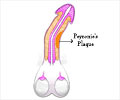A recent study finds that one in four men seeking medical help for newly-developed erectile dysfunction (ED) was younger than 40 years, and nearly half of young men with the condition had severe ED.

To provide more clarity, Paolo Capogrosso, MD, of the University Vita-Salute San Raffaele, in Milan, Italy, and his colleagues assessed the sociodemographic and clinical characteristics of 439 men seeking medical help for newly-developed erectile dysfunction between January 2010 and June 2012 at a single academic outpatient clinic.
Of the 439 patients, 114 (26 percent) were aged 40 years or younger. Compared with older patients, younger patients had a lower average body mass index, a higher average level of testosterone in the blood, and a lower rate of other medical conditions. (Only 9.6 percent of younger patients had one or more concomitant medical conditions compared with 41.7 percent among older patients.) Younger ED patients smoked cigarettes and used illicit drugs more frequently than older patients. Premature ejaculation was more common in younger men, whereas Peyronie's disease (bent erection from scar tissue) was more prevalent in older patients. Severe erectile dysfunction was found in 48.8 percent of younger patients and 40 percent of older patients while the rates of mild, mild-to-moderate, and moderate erectile dysfunction were not significantly different between the two groups.
"These findings, taken together with those of other studies showing the importance of erectile dysfunction as a potential "sentinel marker" of major diseases, outline the importance of taking a comprehensive medical and sexual history and to perform a thorough physical examination in all men with erectile dysfunction, irrespective of their age," said Dr. Capogrosso.
"Erectile function, in general, is a marker for overall cardiovascular function - this is the first research showing evidence of severe erectile dysfunction in a population of men 40 years of age or younger" stated Irwin Goldstein, editor-in-chief of The Journal of Sexual Medicine. "Clinically, when younger patients have presented with erectile dysfunction, we have in the past had a bias that their ED was primarily psychologic-based and vascular testing was not needed. We now need to consider regularly assessing the integrity of arterial inflow in young patients – identifying arterial pathology in such patients may be very relevant to their overall long-term health."
Source-Eurekalert















